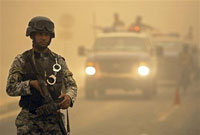US Army Human Terrain System Oddities: Fired in the Field, Promoted at Headquarters
By John Stanton

The Human Terrain Team (HTT) Leader of AF‐1 was removed from his position after a US Army Brigade Commander expressed his concerns to the Human Terrain System (HTS) Program Manager-Forward- Mike Warren.
In a meeting with Warren, the US Army Brigade Commander had expressed his dissatisfaction with the performance and leadership of the retired US Army officer guiding HTT AF-1. The US Army Brigade Commander went on to say, according to a report, that he had no trust or confidence in that individual’s ability to lead the HTT AF‐1.
Warren sent the former HTT Leader packing back to HQ at Fort Leavenworth, Kansas, where his fate was decided by HTS program manager Steve Fondacaro.
He was rewarded with another position in HTS.
According to sources, the disgraced former HTT Leader of AF-1 is still on the HTS payroll running what they refer to as the "Holding Company” (HC). The HC is “all the individuals waiting to be deployed or cannot be deployed. These students normally spend months in the HC. Millions of dollars are wasted each month as the students have nowhere to go and nothing to do.”
Protecting Human Subjects: Depends on the Terrain
One criticism of HTS that seems to have faded from the Net and Mainstream Media is TRADOC leadership/HTS management non-adherence to 32 CFR 219 which requires, unless waived, the services of an active Internal Review Board (IRB). An IRB is an auditing group (includes review of personnel, methodology, execution and work-product) that is critical to ensuring that researchers and their organizations meet the highest ethical and professional standards available. One of the better educational publications on protecting human subjects is the US Department of Energy’s Human Subject Resource Protection Resource Book. Included in the publication are guidelines for researchers and organizations that seek to use humans for social and behavioral research of the ethnographic type practiced by the US Army’s HTS.
The US Department of Defense has signed on to 32 CFR 219 though there are waivers they can apply to programs like the US Army’s HTS. It is not known whether TRADOC’s HTS was granted a waiver by the DOD.
It certainly is easy enough to mock the presence of the words Pentagon and ethical in the same sentence (as many do). But the fact is that millions of dollars and man/woman hours are spent in and out of the Pentagon in an attempt to get the national security community to adhere to legislative guidelines, court rulings and regulatory codes designed to promote ethical behavior, particularly when it comes to drawing out information from another human being. Failure to adhere to an ethical standard in the rush to perform is always a risky undertaking—damage usually ensues.
According to observers, there is “no IRB process that has ever been associated with HTS.”
32 CFR 219 does apply to HTS but management chose to ignore it. There were attempts by the American Anthropological Association to engage HTS management on ethics matters but they failed to take them up the offer.
“HTS management knew the program would not hold up to any ethical scrutiny,” they claim.
John Stanton
Subscribe to Pravda.Ru Telegram channel, Facebook, RSS!


